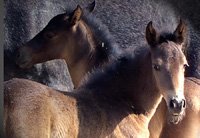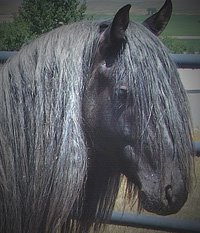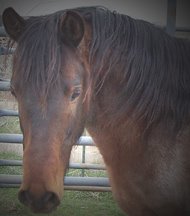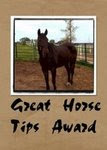Equine misbehavior is an insidious thing. It creeps upon us slowly, almost imperceptibly, when our thoughts are looking the other way.
Aaruba's and my latest point of contention is over pacing at the trot. He would like to go long, fast, and unbalanced as young horses tend to do. I would prefer to spare his limbs the pounding. Unfortunately, we disagree about who should make the decision -- and he's bigger.
There are few things I enjoy less than the sense that the horse beneath me is sliding from under my control. You've felt it: the lightened hoofbeats, the lifted spine, the face tipped just above the bit. One excuse -- a rattling farm truck, a barking dog -- and he's outta there.
The single-rein-stop (SRS, also known as the one-rein-stop) is handy. It's an emergency brake I made sure to install before beginning Aaruba's endurance conditioning. But the SRS isn't always practicable -- along the road while traffic approaches, for example, or when hacking along a steep bank. Much better, I think, to avoid the necessity of short-circuiting a bolt in the first place.
Enter collection.
Aaruba had his first official lesson on the subject yesterday. I had hoped to continue work on his vertical flexion primarily on the trail. It is, after all, a useful means of whiling away the miles, but his threat of runaway behavior has forced the issue.
We started yesterday's lesson with a four mile hack. My own dressage training, though minimal, proved sufficient to work Aaruba through a basic exercise (squeeze with legs and seat, apply steady pressure on one rein, pulse the other rein) enough times that by the end of the ride, he was going in a fairly reliable, young-horse frame at the walk. A brief experiment at the trot, however, revealed not the slightest improvement.
Back on the farm, I tied Aaruba and nipped indoors for a quick break. While running warm water over my icy fingers, I considered the same four questions I ask every time I encounter difficulty with a horse:
1) What is the problem?
2) What caused the problem? (Hint: The answer is almost always "the trainer.")
3) How will I address the problem?
4) What do I hope to achieve today, and how will I know when I've done so?
I reached the following conclusions:
1) The problem is that Aaruba doesn't respect my authority as translated through the bit. He is learning that he is strong enough to run through my request for a slower pace. We have started a downward spiral of his pulling on the bit, resulting in my being heavier handed, resulting in his pulling harder.
2) I caused the problem by failing to establish a rock-solid foundation in vertical flexion before moving into trot work. Too much trotting on the trail has allowed Aaruba's confidence under saddle to outpace his respect for my guidance via the bit.
3) I will address the problem by returning to vertical flexion work in a controlled environment. Before attempting a collected trot on the trail, we will achieve a basic frame and speed control at the trot, as well as smooth trot-to-walk transitions, in the round corral. During these lessons, my hands will remain soft; any strong pull on Aaruba's mouth will result from his actions, not mine.
4) Today, we will focus on maintaining our mental connection while trotting, as evidenced by Aaruba's willingness to attempt vertical flexion at the trot.
Armed with a clear plan and warm, gloved hands, I swung back into the saddle. Half an hour later, Aaruba's face and attitude were softer than they'd been in days. I should have known.
You see, the concept of collection applies to more than the just horse's frame. "Collected" should also describe the a mental state of the trainer, evident in everything from tight abdominals and an open pelvis to a tight plan and an open mind. Just as physical collection prepares the horse for action, mental collection prepares the trainer to deal with issues as they arise.
Had I been more collected over the past several weeks, I could have avoided Aaruba's disrespectful behavior altogether. As it is, I'll quietly gather my thoughts and reins, and carry on with helping my horse succeed.
Subscribe to:
Post Comments (Atom)









1 comment:
"During these lessons, my hands will remain soft; any strong pull on Aaruba's mouth will result from his actions, not mine."
This!!! Yes, absolutely. Try when at all possible to avoid pulling contests with your horses mouth. No one will win. Way to catch the problem.
Post a Comment